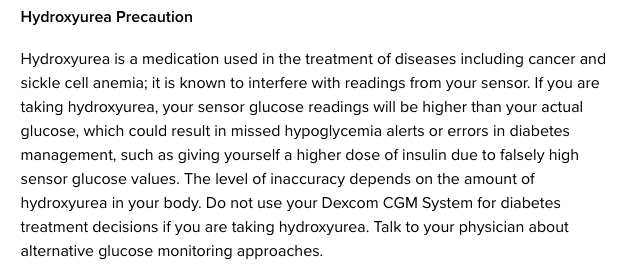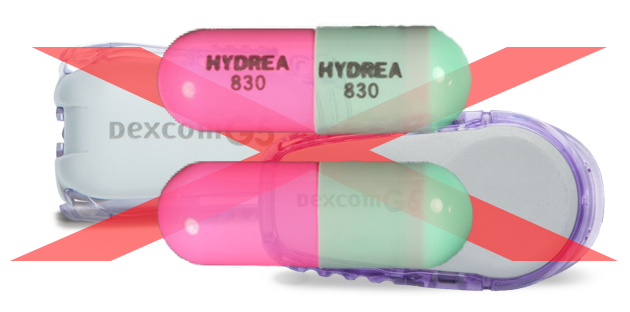Dexcom has just announced for Australia another medication which can interfere with their CGMs.
Hydroxyurea is a cytotoxic medication used mainly in chemotherapy, so hopefully this won’t affect many people. But it has been shown to artificially raise the readings returned by the Dexcom CGMs (without actually raising the blood glucose). Thus caution should be exercised if you are trying to use both. The Dexcom safety information already reflects this:
 AMSL are currently doing a huge mailout to customers informing them of the change and asking them to complete an acknowledgement (presumably to satisfy TGA notification requirements).
AMSL are currently doing a huge mailout to customers informing them of the change and asking them to complete an acknowledgement (presumably to satisfy TGA notification requirements).
Australia behind the times?
But this hydroxyurea interference has actually been known for a while. In the US an FDA Class 2 device recall regarding hydroxyurea and the G6 was initiated by Dexcom in February 2020. Now a year later it’s officially reached Australia, and listed as applying to all of the G4, G5, and G6 devices.
In Australia hydroxyurea is available in two brands: Hydrea and Hyroxycarbamide Medsurge.
Other interferents
Incidentally, it’s not clear at this point whether any other CGMs on the market have been tested and cleared for hydroxyurea interference. We only find out if something interferes if it’s actually been tested.
There are of course other chemicals which can interfere with CGMs.
Paracetamol (acetaminophen)
This analgesic is included in many medications, from cold/flu meds through to plain paracetamol including under the Panadol brand.
With the Dexcom G4/G5 and some of the Medtronic CGMs, this artificially raises the readings. The Dexcom G6 sensors have a coating to protect them from this interference, and the freedom to use paracetamol with it has been one of the marketing points. Only up to the maximum dose of 1000 mg every 6 hours, but still…
In my own experiments the Libre sensors are also unaffected by paracetamol.
Vitamin C (ascorbic acid)
This has been listed as interfering with some CGMs, although I think a fairly massive dose would be required to affect current CGMs.
Tetracycline antibiotics
These are listed as interfering with the Eversense implanted CGM (which we don’t yet get in Australia).
Disclaimers
This is of course just a summary of the information provided by the device manufacturers. For example, see the Dexcom safety information linked earlier. The general advice these give is to consult with your doctor for advice specific to your situation.

